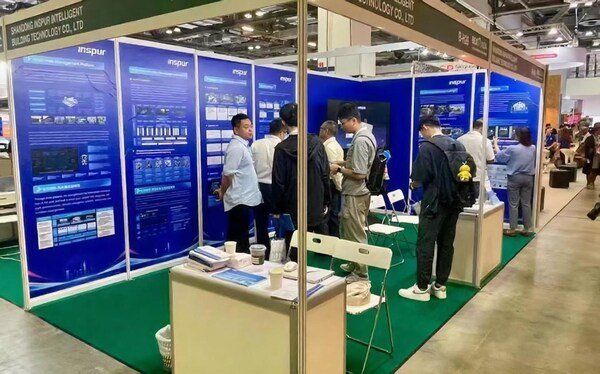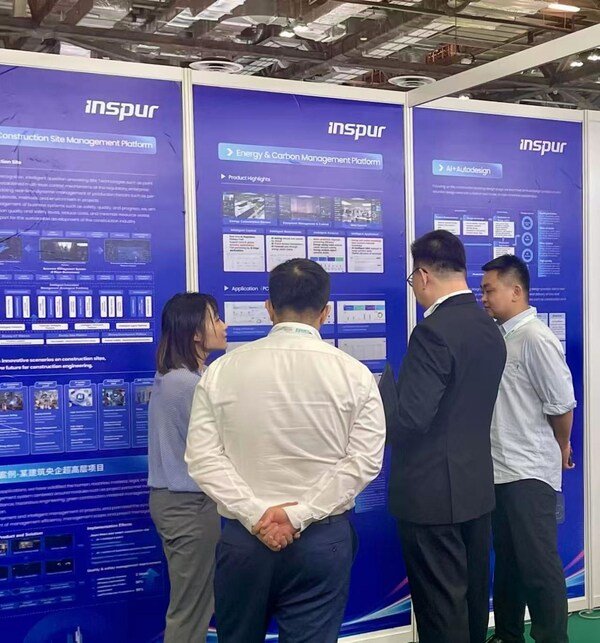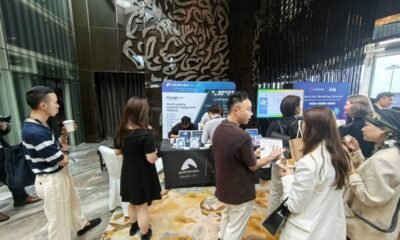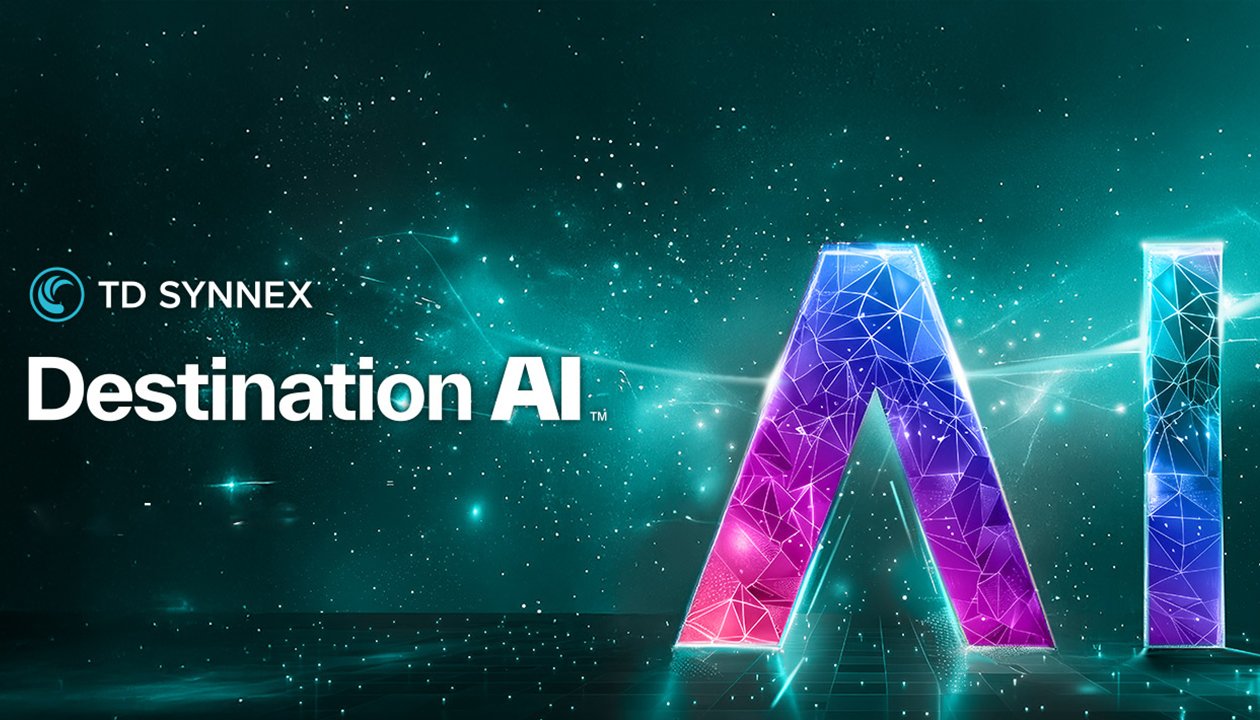The AI revolution is here, and it’s accelerating fast. Don’t get left behind. In this video, TD SYNNEX reveals its Destination AI program—your strategic guide to navigating this rapidly expanding market. Learn how to transform your business and gain a competitive edge with our all-in-one program that offers everything from expert training and certification to ongoing sales support. Join us and harness the incredible power of AI to build a future-proof business.
Tools & Platforms
Shandong Inspur Intelligent Building Technology Showcases AI-Driven Solutions at BEX Asia 2025

SINGAPORE, Sept. 11, 2025 /PRNewswire/ — Shandong Inspur Intelligent Building Technology Co., Ltd. (“Inspur Intelligent Building”), a leading provider of smart building solutions, took center stage at BEX Asia 2025, unveiling its latest advancements in AI-powered smart building systems. Organized by leading global event management company Reed Exhibitions, the exhibition opened on September 3, 2025, at the Marina Bay Sands Expo & Convention Centre in Singapore.
As one of the largest specialized building and construction exhibitions in Southeast Asia, this year’s edition introduced an innovative “four-in-one” exhibition format, co-locating InnoBuild, MCE Asia, and Smart Cities & Building Asia. Centered around the core themes of “Productivity, Sustainability, Energy Efficiency, and Intelligence”, the integrated events brought together resources from across the construction ecosystem to build a professional platform for technology exchange, trend exploration and partnership development.
BEX Asia 2025 attracted over 3,000 global leaders, entrepreneurs, and policymakers across more than 150 exhibition booths. During the event, industry frontrunners expressed strong interest in fostering dialogue on innovation and accelerating the transition to a more sustainable and connected built environment. As a leader in smart building transformation, Inspur Intelligent Building showcased its latest breakthroughs and real-world applications in the integration of artificial intelligence and building technologies, offering scalable, future-ready solutions for developers, owners, and operators.
At the exhibition, Inspur Intelligent Building showcased its integrated applications of AI across the building lifecycle:
- Modular Building Systems: Combining efficient prefabrication, flexible assembly, and intelligent adaptation to deliver cost-effective residential and commercial spaces, reinforcing competitiveness in global markets and the company’s commitment to sustainable building practices;
- AI-Enhanced Design Automation: Enabling human-machine collaboration to standardize and streamline construction design processes;
- Intelligent Site Management Platform: Incorporating AI-powered image recognition, advanced query tools, building information modeling (BIM), and point-cloud imaging to enable real-time project monitoring and precision management of project resources;
- Smart Living Solutions: Delivering a unified IoT platform for whole-home connectivity and intelligent automation, enhanced by large AI models to create personalized occupant experiences;
- Sustainable Building Technologies: Offering a cloud-edge product suite including AI-driven energy optimization, energy and carbon management platforms, and AI edge workstations, designed to help clients reduce energy use and carbon footprint.
Throughout the exhibition, visitors from Singapore, Europe, Southeast Asia and other global markets engaged with Inspur Intelligent Building’s technical team to explore its comprehensive portfolio for AI-assisted design, green building systems, energy and carbon management platforms, smart campus and industrial park systems, intelligent construction sites, and prefabricated steel structures. Live demonstrations and case studies illustrated the company’s engineering expertise and real-world applications, earning positive recognition from industry partners.
This first appearance at BEX Asia 2025 marked an important milestone in Inspur Intelligent Building’s international expansion and opened new growth opportunities in Southeast Asia. Looking ahead, the company plans to continue investing in R&D for AI-enabled smart building technologies, grow its solution ecosystem, and accelerate international growth—supporting the digital, intelligent, and sustainable transformation of the built environment worldwide.
Source: Shandong Inspur Intelligent Building Technology Co., LTD.
Tools & Platforms
Korea’s KIBO Unlocks US$130M AI Guarantee Program to Fuel Startup Growth and Global Competitiveness – KoreaTechDesk

South Korea is intensifying support for its artificial intelligence (AI) ecosystem with a major policy finance initiative. Korea Technology Finance Corporation (KIBO) has committed ₩180 billion (approx. US$130 million) in new AI guarantees focus program for 2025, marking a decisive step in bridging financing gaps for startups and strengthening Korea’s competitiveness in the Asia-Pacific deep-tech race.
KIBO Allocates ₩180B to AI Sector Under BoostUp Strategy
On September 11, KIBO announced that it will supply ₩180 billion (~US$130 million) in guarantees for AI-related companies in 2025, with ₩90 billion (~US$65 million) to be executed in the second half of the year.
The measure aligns with the government’s designation of six “growth engines” — AI, Bio, Contents & Culture, Defense, Energy, and Factory — that underpin Korea’s future competitiveness.
The initiative expands KIBO’s BoostUp Strategy, designed to channel targeted financial support into high-growth industries. AI has been singled out as a priority, and the new guarantee program is structured to address capital shortages that hinder early-stage and scaling firms.
Policy Background: Korea’s Six Growth Engines
The Korean government has identified six priority sectors to sustain economic momentum amid intensifying global competition:
- A: Artificial Intelligence (AI)
- B: Bio
- C: Contents & Culture
- D: Defense
- E: Energy
- F: Factory (manufacturing innovation)
KIBO’s AI-focused financing builds on this framework, aiming to strengthen startups developing or adopting frontier technologies. The program follows the May launch of an AI-specific guarantee product, part of efforts to reduce Korea’s gap in global competitiveness and support SMEs in accelerating AI adoption.
Stakeholder Perspective: KIBO’s Role in AI and Startup Growth
Kim Jong-ho, Chairman of KIBO, emphasized the alignment with national policy:
“KIBO is proactively supporting the government’s innovation-led growth strategy through dedicated AI financial products. We will continue to enhance Korea’s technology competitiveness and back the innovation growth of SMEs and startups as a dedicated policy finance institution.”
AI Guarantee Program and Benefits
The dedicated AI guarantee product, “AI·AX Competitiveness Enhancement Preferred Guarantee,” offers tailored incentives to firms developing or applying AI:
- Guarantee coverage increased to a maximum of 95%
- Fee reductions of up to 0.3 percentage points
- Expanded special calculation provisions for SMEs
In addition, the Semiconductor Industry Special Guarantee targets fabless and semiconductor equipment companies, supporting R&D and localization efforts. This program offers up to ₩20 billion per firm, with the same enhanced guarantee ratios and fee reductions.
To ease financing costs, KIBO is also expanding collaboration with commercial banks, while overseas branches will operate guarantees and investment-attraction programs to help firms expand internationally.
Why the AI Guarantee Program Matters for Korea’s Startup Ecosystem
Basically, the program delivers multiple signals for Korea’s startup ecosystem:
- Bridging capital gaps: By improving guarantee ratios and reducing fees, AI firms can access capital more flexibly, a persistent challenge in early-stage deep-tech.
- Public–private synergy: Integration with banks and global market access programs underscores Korea’s hybrid financing model.
- Global competitiveness: With AI investment accelerating in the U.S., China, and Europe, Korea’s initiative positions local startups to compete in frontier technologies and strengthens the pipeline for future unicorns.
The targeted support also extends Korea’s broader strategy to become a venture capital hub in Asia-Pacific, aligning with recent initiatives such as the government’s Fund-of-Funds commitments in AI and deep-tech.
Korea’s Forward-Looking Strategy for Global AI Competitiveness
In the end, KIBO’s ₩180 billion AI guarantee program reflects Korea’s determination to support startups at the intersection of finance and technology policy. By reducing barriers to capital and expanding tailored support, Korea aims to accelerate the growth of AI and semiconductor ventures that can anchor its next wave of global competitiveness.
Not only that but this move also shows global founders and investors that South Korea is reinforcing its role as a policy-driven innovation hub, where strategic finance mechanisms are tightly linked to national growth priorities and opportunities in frontier technology.
– Stay Ahead in Korea’s Startup Scene –
Get real-time insights, funding updates, and policy shifts shaping Korea’s innovation ecosystem.
➡️ Follow KoreaTechDesk on LinkedIn, X (Twitter), Threads, Bluesky, Telegram, Facebook, and WhatsApp Channel.
Tools & Platforms
FTC launches inquiry into AI chatbots acting as companions and their effects on children

(AP) – The Federal Trade Commission has launched an inquiry into several social media and artificial intelligence companies about the potential harms to children and teenagers who use their AI chatbots as companions.
EDITOR’S NOTE — This story includes discussion of suicide. If you or someone you know needs help, the national suicide and crisis lifeline in the U.S. is available by calling or texting 988.
The FTC said Thursday it has sent letters to Google parent Alphabet, Facebook and Instagram parent Meta Platforms, Snap, Character Technologies, ChatGPT maker OpenAI and xAI.
The FTC said it wants to understand what steps, if any, companies have taken to evaluate the safety of their chatbots when acting as companions, to limit the products’ use by and potential negative effects on children and teens, and to apprise users and parents of the risks associated with the chatbots.
The move comes as a growing number of kids use AI chatbots for everything — from homework help to personal advice, emotional support and everyday decision-making. That’s despite research on the harms of chatbots, which have been shown to give kids dangerous advice about topics such as drugs, alcohol and eating disorders. The mother of a teenage boy in Florida who killed himself after developing what she described as an emotionally and sexually abusive relationship with a chatbot has filed a wrongful death lawsuit against Character.AI. And the parents of 16-year-old Adam Raine recently sued OpenAI and its CEO Sam Altman, alleging that ChatGPT coached the California boy in planning and taking his own life earlier this year.
Character.AI said it is looking forward to “collaborating with the FTC on this inquiry and providing insight on the consumer AI industry and the space’s rapidly evolving technology.”
“We have invested a tremendous amount of resources in Trust and Safety, especially for a startup. In the past year we’ve rolled out many substantive safety features, including an entirely new under-18 experience and a Parental Insights feature,” the company said. “We have prominent disclaimers in every chat to remind users that a Character is not a real person and that everything a Character says should be treated as fiction.”
Snap said its My AI chatbot is “transparent and clear about its capabilities and limitations.”
“We share the FTC’s focus on ensuring the thoughtful development of generative AI, and look forward to working with the Commission on AI policy that bolsters U.S. innovation while protecting our community,” the company said in a statement.
Meta declined to comment on the inquiry and Alphabet, OpenAI and X.AI did not immediately respond to messages for comment.
OpenAI and Meta earlier this month announced changes to how their chatbots respond to teenagers asking questions about suicide or showing signs of mental and emotional distress. OpenAI said it is rolling out new controls enabling parents to link their accounts to their teen’s account.
Parents can choose which features to disable and “receive notifications when the system detects their teen is in a moment of acute distress,” according to a company blog post that says the changes will go into effect this fall.
Regardless of a user’s age, the company says its chatbots will attempt to redirect the most distressing conversations to more capable AI models that can provide a better response.
Meta also said it is now blocking its chatbots from talking with teens about self-harm, suicide, disordered eating and inappropriate romantic conversations, and instead directs them to expert resources. Meta already offers parental controls on teen accounts.
Copyright 2025 The Associated Press. All rights reserved.
Tools & Platforms
Destination AI | IT Pro
-

 Business2 weeks ago
Business2 weeks agoThe Guardian view on Trump and the Fed: independence is no substitute for accountability | Editorial
-
Tools & Platforms1 month ago
Building Trust in Military AI Starts with Opening the Black Box – War on the Rocks
-

 Ethics & Policy2 months ago
Ethics & Policy2 months agoSDAIA Supports Saudi Arabia’s Leadership in Shaping Global AI Ethics, Policy, and Research – وكالة الأنباء السعودية
-

 Events & Conferences4 months ago
Events & Conferences4 months agoJourney to 1000 models: Scaling Instagram’s recommendation system
-

 Jobs & Careers2 months ago
Jobs & Careers2 months agoMumbai-based Perplexity Alternative Has 60k+ Users Without Funding
-

 Podcasts & Talks2 months ago
Podcasts & Talks2 months agoHappy 4th of July! 🎆 Made with Veo 3 in Gemini
-

 Education2 months ago
Education2 months agoMacron says UK and France have duty to tackle illegal migration ‘with humanity, solidarity and firmness’ – UK politics live | Politics
-

 Education2 months ago
Education2 months agoVEX Robotics launches AI-powered classroom robotics system
-

 Funding & Business2 months ago
Funding & Business2 months agoKayak and Expedia race to build AI travel agents that turn social posts into itineraries
-

 Podcasts & Talks2 months ago
Podcasts & Talks2 months agoOpenAI 🤝 @teamganassi











